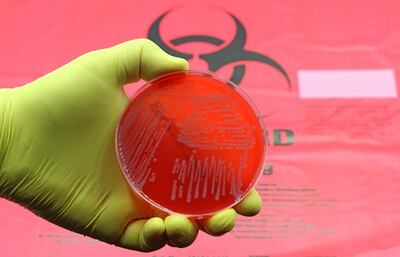Scientists have discovered a new class of antibiotic that is showing remarkable success against one of the world’s most dangerous drug-resistant bacteria.
Zosurabalpin defeated strains of Carbapenem-resistant Acinetobacter baumannii (Crab) – a major cause of hospital infections, particularly in patients on ventilators – in mice.
The World Health Organisation classifies Crab as one of three category 1 critical pathogens, for which new antibiotics are urgently needed due to their extensive drug-resistance.
Dr Andrew Edwards, a senior lecturer in molecular microbiology at Imperial College London, who was not involved in the research, said the challenge presented by Crab was its resistance to multiple antibiotics, making it incredibly difficult to treat.
“Crab is a significant cause of infection in hospitals, particularly in people who are on ventilators,” he said.
“Unfortunately, development of new treatments against this bacterium has been extremely challenging because it is very adept at keeping antibiotics from getting past its outer cell layer.”
Zosurabalpin’s efficacy was demonstrated in mice against pneumonia and sepsis, and this success has sparked hope for the current human trials.
Dr Edwards said: “This work is really exciting, and provides confidence that the approaches being used to find new antibiotics can bear fruit.”
Gram-negative bacteria, like Crab, pose an urgent threat to human health.
They are protected by an outer shell containing lipopolysaccharide (LPS), explained Dr Michael Lobritz, global head of infectious diseases at Roche Pharma Research and Early Development, which developed Zosurabalpin.

“LPS allows bacteria to live in harsh environments, and it also allows them to evade attack by our immune system,” he said.
“This is the first time we’ve found anything that operates in this way, so it is unique in its chemical make-up and mechanism of action.”
A Roche representative told The National: “Without the ability to transport LPS the bacteria die. The new molecule overcomes the existing drug-resistance mechanisms that the currently available antibiotics are failing to address.”
No new antibiotic targeting Gram-negative bacteria has been approved in over 50 years, making Zosurabalpin’s discovery all the more crucial.
“Any new antibiotic class that has the ability to treat infections caused by multidrug resistant (MDR) bacteria such as Carbapenem-resistant Acinetobacter baumannii (Crab) would be a significant breakthrough,” the Roche representative added.
“Zosurabalpin has many features that position it to be a medical breakthrough, and future human clinical trials will inform whether it has the potential to address a major gap in the fight against antimicrobial resistance.
They added: “A range of phase 1 trials of Zosurabalpin in humans are currently ongoing. These studies aim to test safety, tolerability, and pharmacokinetics (the concentration of zosurabalpin in the human body over time).”
Roche had initially identified Zosurabalpin as capable of inhibiting the growth of A. baumannii.
Prof Daniel Kahne at Harvard University and colleagues later revealed that the drug works by preventing LPS from reaching the bacterium's outer membrane, effectively killing it.
In mouse trials, Zosurabalpin significantly reduced bacterial levels and prevented death in cases of Crab-related sepsis.
While Dr Lobritz acknowledged that Zosurabalpin alone won’t solve the public health threat of antimicrobial-resistant infections, its unique chemical make-up and mechanism of action set a foundation for future drug development targeting similar transport systems in other bacteria.
In parallel, Dr Edwards said another antibiotic, murepavadin, targets LPS transport through a different mechanism.
“[Murepavadin] has been shown to be active against a bacterium called Pseudomonas aeruginosa, suggesting that it may be possible to expand this work to other multi-antibiotic resistant bacteria such as Klebsiella and E coli,” he said.
However, he cautioned about the challenges in transitioning new drugs from animal studies to human applications.
Amid these developments, the UK’s science, innovation, and technology committee has advocated exploring bacteriophages, viruses that kill bacteria, as an alternative to antibiotics for resistant infections.
What is antimicrobial resistance?
Antimicrobial resistance (AMR) occurs when tiny organisms like bacteria, which can cause infections, learn to outsmart medicines such as antibiotics.
Normally, these antibiotics kill bacteria or stop their growth. But when bacteria become resistant, these antibiotics are no longer effective, making infections harder to treat.
Imagine bacteria as tiny invaders in your body; antibiotics are like a special force sent to defeat them.
But sometimes, these invaders adapt to survive these attacks, becoming “superbugs”.
These antibiotic-resistant superbugs turn treatable infections into serious health problems.
AMR gets worse due to misuse of these medicines
When antibiotics are overused or used incorrectly, it gives bacteria more chances to become resistant.
Poor practices in controlling infections, like not washing hands properly, also contribute to this problem.
Another concern is the use of antibiotics in animals, such as those raised for food.
If these animals carry resistant bacteria, they can pass them to humans, increasing the spread of AMR.
One of the biggest challenges is that there aren't many new antibiotics being developed. This means we're running out of effective tools to fight these resistant bacteria.
Experts warn that if we don’t tackle AMR, it could lead to more deaths each year than currently caused by cancer.
To prevent this, a co-ordinated effort is needed, involving not just humans but also the animal and environmental sectors.


